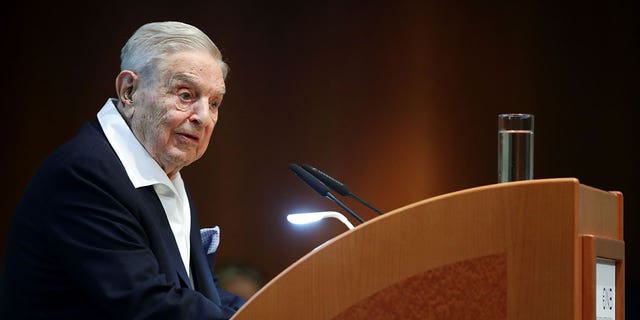NEWYou can now listen to Fox News articles!
Editor’s note: The following column first appeared in City Journal.
George Soros took to the Wall Street Journal this week to defend his financial support for “reform prosecutors.” He began by asserting that “Americans desperately need a more thoughtful discussion about our response to crime.” I couldn’t agree more. That’s why I wrote a book (out last week) on our ongoing national debate about crime and justice.
Sadly, Soros’s piece failed to deliver that thoughtful discussion. Instead, the philanthropist offered a shallow, essentially data-free collection of platitudes—”If people trust the justice system, it will work”—and incomplete observations.
Soros highlights the statistic that “black people in the U.S. are five times as likely to be sent to jail as white people.” This is, he says without explanation, “an injustice that undermines our democracy.” Such a contention is meant to persuade the reader that these incarcerations are mostly (if not overwhelmingly) illegitimate—the product of racial animus more than anything else.
What else could it be? Well, how about disparate rates of criminal offending? A Bureau of Justice Statistics study of homicides between 1980 and 2008 found that Blacks commit homicide offenses at a rate “almost eight times higher than the rate for whites.”
GEORGE SOROS WANTS TO ‘ELIMINATE LAW ENFORCEMENT,’ POLICIES WOULD BE A ‘WELCOME SIGHT’ FOR CRIMINALS: TERRELL
Presenting a disparity without any mention of what its causes might be is not a responsible way of arguing that “injustice” is afoot. That’s a serious charge, and, as we’ve seen over the last few years, many who believe it will push (often successfully) for serious policy changes couched in breezy phrases like “reimagining public safety.”
I wish Soros were as interested in even starker, more persistent disparities: namely, those regarding violent victimization.
When relevant factors are taken into account, the disparities that Soros point to as obvious evidence of injustice shrink substantially, undercutting his claim. As a 2014 report on incarceration from the National Academies of Sciences shows: “Racial bias and discrimination are not the primary causes of disparities in sentencing decisions or rates of imprisonment. … Overall, when statistical controls are used to take account of offense characteristics, prior criminal records, and personal characteristics, black defendants are on average sentenced somewhat but not substantially more severely than whites.”

FILE — Billionaire philanthropist and activist George Soros
(Simon Dawson/Bloomberg via Getty Images)
I wish Soros were as interested in even starker, more persistent disparities: namely, those regarding violent victimization. We often speak of crime in national, state, or citywide terms. While crime does affect society writ large, some communities feel its sting more than others.
CLICK HERE TO GET THE OPINION NEWSLETTER
In 2020—a year in which homicides rose nearly 30 percent across the U.S.—the share of White homicide victims actually declined by 2.4 percentage points relative to 2019, while the share of Black and Hispanic victims increased by 2.2 percentage points. The Black homicide victimization rate was almost ten times the white rate that year.
In my home city of New York, at least 95 percent of shooting victims every year, going back at least to 2008, are either Black or Hispanic. Blacks and Hispanics don’t constitute anywhere near 95 percent of the city’s residents. A University of Chicago Crime Lab analysis found that, in that city, just under 80 percent of homicide victims were Black. It also found that almost 20 percent of gun-violence suspects in 2015 and 2016 had at least 20 prior arrests.
Soros and his beneficiaries have built a movement around the proposition that criminal offenders in cities like New York and Chicago are treated too harshly and are systematically denied “second chances.” In addition to the data on the degree to which serious violence is committed by repeat offenders, this claim is also undercut by the fact that that those released from state prisons and tracked by the Bureau of Justice Statistics had, on average, around ten prior arrests and five prior convictions before their most recent stints.

FILE – Billionaire investor George Soros speaks to the audience at the Schumpeter Award in Vienna, Austria June 21, 2019.
(REUTERS/Lisi Niesner/File Photo)
Soros offers nothing in the way of support for the victims of violent crimes committed by those who have received many “second chances.” Perhaps that’s because, in his mind, there is “no connection between the election of reform-minded prosecutors and local crime rates.” In support of that claim, he cites a single analysis, whose authors are, as they say in the very paper he references, unable to “rule out large increases or decreases in any particular type of crime.”
CLICK HERE TO GET THE FOX NEWS APP
Rather than engage the substance of his critics’ arguments, Soros implies that they’re hypocrites by highlighting the overlap between them and opponents of progressive gun control measures—ignoring, of course, the substantial overlap between supporters of such measures and those who want to divert gun offenders and would-be shooters away from incarceration. It does not seem to have dawned on Soros that sending shooters with lengthy criminal histories back onto the street actually worsens gun violence.
Here’s hoping that voters will begin to see the truth to which George Soros and his supporters seem blind—that, while our system is imperfect, true justice requires that dangerous offenders be stopped from harming innocent people.
CLICK HERE FOR MORE FROM RAFAEL MANGUAL